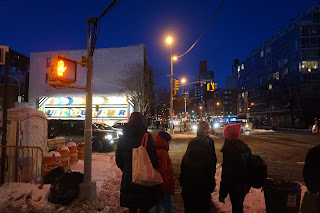 |
| This writer, with camera, and Jean Montrevil's kids. Source, The Indypendent. |
 |
 taking in some art on a cold winter's day. The signs of our new gilded age are everywhere, in the homeless sleeping in the subways, the workers protesting for better working conditions, immigrants fighting deportation, corporations lobbying for deregulation of environmental protections, even the spectacle of our increasingly exponential inequality. Friday, I rode my bike into the city for a vigil for my friend Jean Montrevil, who is being held by ICE as we speak. I don't know when people became so scared of immigrants. But this doesn't help bring us together. On the way there, I passed a group of workers with signs protesting new work regulations seen as legalizing a 24-hour work day for home attendants. I could not stay as I had the vigil to attend up the street. (We'll have another the Solidarity Vigil Against Deportation on January 11th at 9 AM at Foley Square). At the rally, I ran into friends from all over NYC, including John Tarleton, who wrote about it in the Indypendent. |
Later that afternoon, the kids and I meandered back through the snow to the International of Contemporary Photography. I snapped a few photos from a film montage dubbed "Images of Social Change" from the ICP collection, images of AIDS activists, torture, the poor, people in trains, sexual civil liberties activism, civil rights, the homeless, people struggling to survive on the street. The images were a stark juxtaposition to "Generation Wealth," Lauren Greenfield's aptly titled exploration of the meaning of money in the age of inequality. GENERATION WEALTH by Lauren Greenfield presents 25 years of work by Greenfield, who uses photography, oral history, and film to examine the pervasive influence of money, status, and celebrity in America and abroad. The first major retrospective of Greenfield’s work, the exhibition features nearly 200 photographs, numerous first-person interviews, and documentary film footage, forming a thematic investigation of how the pursuit of wealth, and its material trappings and elusive promises of happiness, has evolved since the late 1990s. Weaving together stories about affluence, beauty, body image, competition, corruption, fantasy, and excess, Greenfield’s sweeping project questions the distance between value and commodity in a globalized consumerist culture. The images of kids dressed for beauty pageants, of college kids stripping for for tuition, women staving themselves to get work, it reminds me that the commodity fetish i everywhere. We try to have meaningful relationships, but economic and transactional dynamics are everywhere. Its a part of us thats hard to look at. But Greenfield does so, exploring her childhood of affluence, reflecting, and then looking outward. The best anthropology is self confession, after all. We are all a little crazy today; our lust for things, for The insight is nothing new. The commodity forms extends through our world. We look at people for what they can give us, what we can get out of our interactions with them. The commodity form extends into the darkest places of our lives. Shakespeare talked about it in Bastard's speech in King John 2.1 |
John, to stop Arthur's title in the whole,
Hath willingly departed with a part,
And France, whose armour conscience buckled on,
Whom zeal and charity brought to the field
880
As God's own soldier, rounded in the ear
With that same purpose-changer, that sly devil,
That broker, that still breaks the pate of faith,
That daily break-vow, he that wins of all,
Of kings, of beggars, old men, young men, maids,
885
Who, having no external thing to lose
But the word 'maid,' cheats the poor maid of that,
That smooth-faced gentleman, tickling Commodity,
Commodity, the bias of the world,
The world, who of itself is peised well,
890
Made to run even upon even ground,
Till this advantage, this vile-drawing bias,
This sway of motion, this Commodity,
Makes it take head from all indifferency,
From all direction, purpose, course, intent:
895
And this same bias, this Commodity,
This bawd, this broker, this all-changing word,
Clapp'd on the outward eye of fickle France,
Hath drawn him from his own determined aid,
From a resolved and honourable war,
900
To a most base and vile-concluded peace.
And why rail I on this Commodity?
But for because he hath not woo'd me yet:
Not that I have the power to clutch my hand,
When his fair angels would salute my palm;
905
But for my hand, as unattempted yet,
Like a poor beggar, raileth on the rich.
Well, whiles I am a beggar, I will rail
And say there is no sin but to be rich;
And being rich, my virtue then shall be
910
To say there is no vice but beggary.
Since kings break faith upon commodity,
Gain, be my lord, for I will worship thee.
Mad world! mad kings! mad composition!
Christian A. Smith writes, "The word “commodity” in the Bastard's speech in King John 2.1 is listed in the O.E.D. as an example of definition 2b, “expediency”... This also opens a space for King John to be read as a critique of the alienating effects of the newly emerging economic system in the early modern period – capitalism."
Marx loved this line, referring to it frequently, looking at it as a way to begin an exploration of the alienating dynamics of our economic and social system. That's part of the fun of reading social theorist who built a critique of capitalism with the writings of Shakespeare, Cervantes, Goethe, Balzac, Shelly, and so on.
David Harvey begins his new study Marx, Capital and the Madness of Economic Reason, with the quote from King John.
Marx contends that this chase for money is far from sustainable. Its impact on people and the world is both amazing and barbaric, the contradictions expanding and exploding into new categories as old one's lose meaning.
We read Harvey in the morning at my book group at the Commons.
And Elizabeth Kolbert's the Sixth Extinction in the afternoon for my second book group.
We love each other and bicker incessantly about who is talking, interrupting, too pushy, who's place we should meet at, what the book's mean, when we can have another session and if we should have one or two sessions for the Golden Notebooks, our next session. I vote for two sessions.
 |
| joan e. roney's favorite passages from The Sixth Extinction. |
The world is certainly crazy. Everyone knows it. But these might be the best days of our lives.
As Nicholas Kristof puts it:"We all know that the world is going to hell. Given the rising risk of nuclear war with North Korea, the paralysis in Congress, warfare in Yemen and Syria, atrocities in Myanmar and a president who may be going cuckoo, you might think 2017 was the worst year ever. But you’d be wrong. In fact, 2017 was probably the very best year in the long history of humanityA smaller share of the world’s people were hungry, impoverished or illiterate than at any time before. A smaller proportion of children died than ever before. The proportion disfigured by leprosy, blinded by diseases like trachoma or suffering from other ailments also fell."
He's right. We do need a little perspective, a little history to help us look at this ever shifting, ever evolving moment of history. No one can predict the future. Will capitalism fuel the warming of the planet beyond repair, fueling destruction? Could the Sixth Extinction be on its way - quite possibly, as Elizabeth Kolbert cheerfully contends. But there are a hell of a lot of hero's out there, doing their best to stave it off.
Can technology save it or will it's solutions create more unintended consequences than we can handle?
Any further pessimism doesn't really help, as my friend Paul Davis reminds us.
We have organizing and living to do, even in the midst of our new gilded age, even as last week's snow gives way to this week's thaw.
 |
| A week in the life. |




















































































































































No comments:
Post a Comment